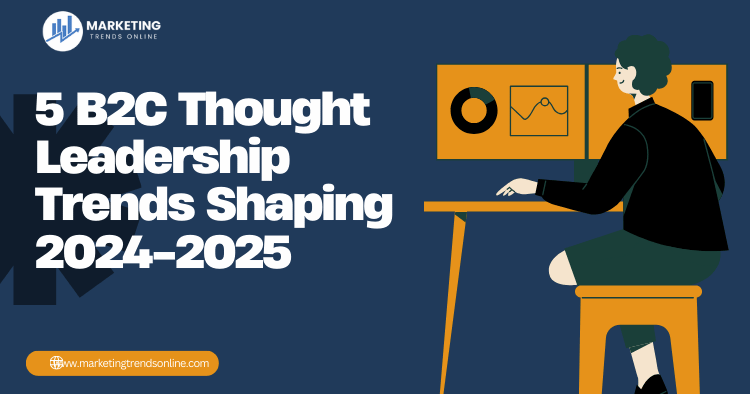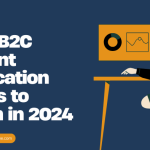Table of Contents
- Introduction
- Trend 1: Authenticity and Transparency
- Trend 2: Data-Driven Decision Making
- Trend 3: Sustainability and Social Responsibility
- Trend 4: Personalization and Customer Experience
- Trend 5: The Rise of Influencer Collaborations
- Conclusion
- FAQs
Introduction
As we venture into 2024 and 2025, the landscape of business-to-consumer (B2C) thought leadership is evolving rapidly. Brands are not just selling products; they are establishing themselves as authoritative voices in their industries. This article will explore five key trends shaping B2C thought leadership in the coming years, helping brands connect with their audiences in meaningful ways.
Trend 1: Authenticity and Transparency
In a digital age overwhelmed by information, consumers are seeking brands that are genuine and transparent. Authenticity has become a cornerstone of effective B2C marketing. According to a study by Edelman, 81% of consumers say they need to be able to trust the brand to buy from them.
“Authenticity isn’t just a marketing trend; it’s a fundamental shift in how brands engage with their customers. Trust is the new currency.”
Why It Matters
- Consumer Trust: Brands that showcase their genuine values and practices build stronger relationships with their customers.
- Engagement: Authenticity fosters a sense of community. Engaged consumers are more likely to share their experiences, boosting word-of-mouth marketing.
Implementing Authenticity
Brands can embrace authenticity by:
- Sharing Behind-the-Scenes Content: Use storytelling to showcase your brand’s journey, values, and people.
- Engaging in Open Dialogue: Encourage feedback and respond to customer inquiries transparently.
Trend 2: Data-Driven Decision Making
Data is the lifeblood of modern marketing. In 2024-2025, B2C thought leaders will increasingly rely on data analytics to guide their strategies. Insights derived from data will inform everything from product development to marketing tactics.
“Data empowers brands to not just guess what customers want but to know it. It’s about turning insights into action.”
Why It Matters
- Targeted Marketing: Data allows brands to segment their audiences and tailor their messaging effectively, aligning with the trend of data-driven content marketing.
- Performance Measurement: Analytics helps track campaign effectiveness, enabling continuous improvement.
Tools and Techniques
- Customer Relationship Management (CRM) Systems: Tools like HubSpot or Salesforce help brands manage customer data.
- Analyzing Consumer Behavior: Use tools like Google Analytics to understand how customers interact with your website.
Trend 3: Sustainability and Social Responsibility
Consumers are increasingly concerned about the environment and social issues. Brands that actively promote sustainability and social responsibility stand out in the crowded marketplace.
“Sustainability is no longer an option; it’s a necessity. Brands that ignore this trend risk losing relevance.”
Why It Matters
- Consumer Expectations: A 2021 report by PwC found that 88% of consumers want brands to help them be more environmentally conscious.
- Brand Loyalty: Companies that prioritize social responsibility often enjoy higher customer loyalty.
Strategies for Implementation
- Sustainable Practices: Adopt eco-friendly materials and processes in your supply chain. This aligns with the growing importance of sustainability trends in marketing.
- Community Engagement: Partner with local organizations to support social causes.
Trend 4: Personalization and Customer Experience
Personalization is no longer optional; it’s expected. Brands that provide tailored experiences will lead the market in the coming years.
“Personalization is the key to customer satisfaction in today’s marketplace. It’s about making each customer feel valued.”
Why It Matters
- Enhanced Customer Satisfaction: Personalized experiences make customers feel valued, leading to higher satisfaction rates.
- Increased Conversions: According to Epsilon, 80% of consumers are more likely to make a purchase when brands offer personalized experiences.
How to Achieve Personalization
- Utilize Customer Data: Leverage data to create targeted marketing campaigns that resonate with individual preferences, reflecting the content personalization trends.
- Dynamic Content: Use dynamic content in emails and websites to show relevant products or services.
Trend 5: The Rise of Influencer Collaborations
Influencer marketing continues to grow, with brands increasingly partnering with influencers to reach wider audiences and establish credibility.
“In an era of skepticism, influencers can bridge the gap between brands and consumers by adding a layer of trust.”
Why It Matters
- Trust and Credibility: Influencers often have established trust with their followers, making their endorsements powerful.
- Expanded Reach: Collaborating with influencers can help brands tap into new demographics.
Best Practices for Influencer Collaborations
- Choose the Right Influencers: Look for influencers whose values align with your brand and who engage authentically with their audience.
- Build Long-Term Relationships: Instead of one-off collaborations, focus on building lasting partnerships for consistent messaging.
Conclusion
As we approach 2024-2025, B2C thought leadership will be defined by authenticity, data-driven decisions, sustainability, personalization, and influencer collaborations. Brands that embrace these trends will not only enhance their market presence but also foster deeper connections with their consumers.
FAQs
Q1: How can brands ensure authenticity in their messaging?
A1: Brands can ensure authenticity by being transparent about their practices, sharing real stories from their team, and encouraging customer feedback.
Q2: What tools can help with data-driven decision-making?
A2: Tools like Google Analytics, HubSpot, and Salesforce are excellent for collecting and analyzing customer data.
Q3: Why is sustainability important for B2C brands?
A3: Sustainability is crucial because consumers are increasingly demanding eco-friendly practices and are more likely to support brands that align with their values.
Q4: How can brands personalize their marketing efforts?
A4: Brands can personalize marketing by using customer data to tailor content, offers, and communications specifically to individual preferences.
Q5: What are the benefits of influencer marketing?
A5: Influencer marketing can increase brand trust, expand reach, and enhance engagement with target audiences.
By embracing these trends, B2C brands can position themselves as thought leaders and create lasting connections with their customers. For further insights, check out Marketing Trends Online for expert articles on B2C marketing strategies.





